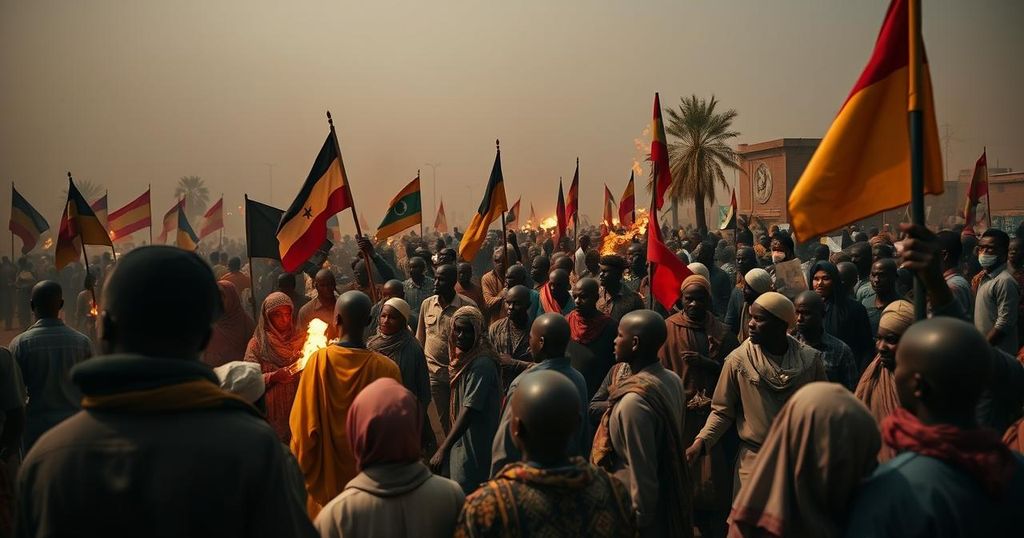Diminishing Support for Military Juntas in the Sahel Region Amidst Civil Unrest and Repression

In the Sahel region, discontent is growing towards military juntas in Mali, Burkina Faso, and Niger due to unfulfilled promises and the oppressive tactics of Russian mercenaries. An investigation reveals deteriorating living conditions, rising civilian casualties, and a crackdown on dissent, contrasting the juntas’ alleged goals with the realities facing the populace.
The Sahel region, comprising Mali, Burkina Faso, and Niger, has witnessed a surge in discontent towards military juntas that seized power amid allegations of collusion between civilian leaders and their former colonial power, France, primarily regarding the exploitation of natural resources. Following the coups occurring between 2021 and 2023, civilians displayed Russian flags while burning French ones to express their protests. However, as indicated by a recent investigative report, support for these juntas is waning. The juntas have failed to fulfill their promises, compounded by the severe actions of Russian mercenaries against the civilian populace. Evelyn Groenink, coordinator of ZAM, commented on this growing discontent, noting, “The first slogans, ‘Russia out,’ have appeared on the walls of the Russian office in Niger. It’s a sign that a debate is taking place.” In the investigation titled “Hotel Kremlin,” journalists Malick Sadibou Coulibaly, Ramdane Gidigoro, and Rachid Zaid Combary conducted undercover research in the three countries, revealing dire living conditions under military rule. Coulibaly replicated the frustration of Malians enduring relentless power outages, stating, “It is 7 p.m. Everything is dark here. The lights are out…”. This investigation highlighted that hopes for improvement following the removal of civilian governments have not materialized. While the juntas initially elevated the Wagner Group, now termed Africa Corps, as an effective alternative against terrorism, the report indicates increasing civilian and military casualties instead. In a harrowing account, Coulibaly reported that a morgue in Bamako was overwhelmed, indicating that 200 bodies had been accumulated from March to May alone. Meanwhile, public patience is wearing thin in the capitals of Bamako, Niamey, and Ouagadougou. In a strategic move to counter regional sanctions, the military governments signed the Alliance of Sahel States on July 6, formalizing their ostensible departure from the West African economic bloc ECOWAS and signaling a deeper alignment with Russia. However, this treaty has not translated into economic benefits for the populace, with stark contrasts evident between the opulence seen in military leaders’ accommodations and the continued struggle of ordinary citizens. Moreover, the investigation uncovered increasing repression of dissent, with opposition leaders and journalists facing crackdowns in all three countries. In Burkina Faso, the government allegedly conducted forced disappearances. In Mali, political party activities were suspended, and in Niger, similar oppressive patterns are apparent despite less detailed reports. Human rights organizations have expressed severe concerns over these developments. The long-standing resentment towards France seems to have intensified amid perceived failures to effectively back regional governments against terrorism, serving as fertile ground for Russian disinformation campaigns touting Wagner’s role in combating insecurity. However, it has become increasingly evident that rather than improving safety, Wagner’s involvement has led to heightened violence and atrocities against civilians, as noted by Coulibaly, who asserted, “In northern Mali, they terrorize, rape, and commit numerous atrocities.”
The Sahel region has been marked by political instability and military coups, where leaders have often criticized France for past colonial actions and alleged exploitation of local resources. The advent of military juntas has led to a complicated relationship with new allies, notably Russia and the Wagner Group, amidst promises of stability that have not been fulfilled. With new investigative reports emerging, there is a changing narrative among the local populations regarding their rulers, as initial fervor gives way to disillusionment and demands for accountability and change.
The situation in the Sahel region showcases a critical shift in public sentiment towards the military juntas in Mali, Burkina Faso, and Niger, as initial hopes for progress have devolved into disillusionment due to governance failures and harsh realities under military rule. The rise of anti-Russian sentiment signals the need for these regimes to address civilian suffering and adopt measures leading to genuine improvement in living conditions, lest they face rising unrest and demands for change from their citizens. Additionally, the ongoing political repression raises significant human rights concerns that may further complicate the future stability of the region.
Original Source: www.dw.com








